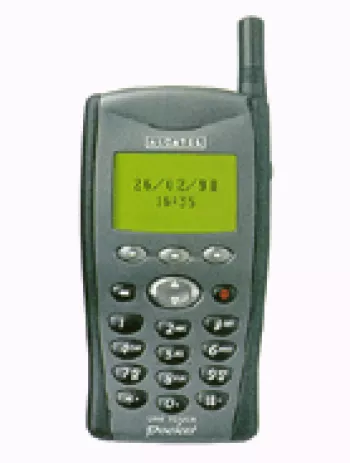
Network and Connectivity
The alcatel OT 155 was equipped with GSM technology, operating on 2G bands, specifically GSM 900 and 1800. During its time, this standard was typical and provided adequate voice service capabilities with acceptable coverage and signal strength. Unfortunately, technologies such as GPRS and EDGE were not available in this model, rendering the phone incapable of supporting any form of data connectivity beyond voice and simple messaging services. This may have limited its appeal in an emerging market of mobile data communication. The absence of technologies such as WLAN, Bluetooth, and others further restricted its connectivity options, aligning more with the basic phone category rather than a precursor to the smartphone era.
Release and Lifecycle
Announced in the first quarter of 2004, the alcatel OT 155 was introduced into a rapidly evolving market. At this time, the mobile phone industry was in a phase of swift evolution, with new technologies rapidly being introduced. Despite this, it primarily targeted budget-conscious consumers looking for straightforward mobile communication. The phone has since been discontinued, signifying its role in the history of mobile phone development as a transitional device toward more connected mobile experiences.
Design and Build
The design of the alcatel OT 155 is functional and straightforward, characteristic of early mobile phones. Its physical dimensions were 100 x 46 x 21mm, with a weight of 85 grams. This made it compact and relatively lightweight, ensuring comfortable handling and operation. The phone utilized a Mini-SIM, which was standard during the period of its production. While the aesthetics were modest, focusing on practicality over style, it adequately served the needs of its user base who prioritized utility over luxury.
Display Characteristics
Featuring a grayscale graphic display, the alcatel OT 155's screen was sufficient for basic operations. While it did not have the vibrant colors or high resolution of later models, the resolution of 101 x 65 pixels was appropriate for the line-based graphic interface it supported. Given the technological constraints of its time, the display was a testament to function-focused design, suited to its practical features and tasks.
Memory and Storage
The alcatel OT 155 was equipped with minimal memory options. The absence of a card slot meant that expandable storage was not available to users, who relied solely on SIM card-stored contacts. This limited storage capability was indicative of its primary function - voice calls and SMS communications, necessitating only the basic level of virtual storage. It stored up to 10 dialed, 10 received, and 10 missed calls, serving basic communication needs efficiently without the complexities of advanced data management.
Audio and Sound Features
A major feature of the alcatel OT 155 was its audio alert systems. Although it lacked a loudspeaker and a 3.5mm audio jack, it supported downloadable polyphonic ringtones, which added a degree of personalization within the constraints of its capabilities. Vibration served as an alternative alert method, rounding out the phone's notification features, despite its lack of broader audio functionality.
Communication Capabilities
The phone was geared toward straightforward communication with SMS and EMS messaging capabilities. Without advanced browsing or multimedia functions, it focused purely on short text communications. Notably, its lack of a browser and Java support meant that it offered no internet capabilities, but it did include simple games like Bricks and Snake to cater to users looking for basic entertainment.
Battery Life
A key strength of the alcatel OT 155 was its battery efficiency. It featured a removable Li-Ion battery with a standby time of up to 220 hours, and talk time extending to 4 hours and 30 minutes. This battery life was particularly impressive given its contemporaries, providing reliability that assured continuous communication over several days without frequent recharging, an important feature prior to the smartphone's fast-draining batteries.
Features and Miscellaneous
The alcatel OT 155 did not include sensors or advanced technical specs seen in later phones. Its simplistic nature limited its additional features, focusing on providing a reliable means of communication. It was offered in one color, consistent with the utilitarian approach characterizing this device. Overall, while it lacks the connectivity and multimedia functions of modern devices, its endurance, straightforward design, and communication focus make it noteworthy in the history of mobile technology development.
Main Features of Alcatel OT 155
- Compact and lightweight design (100 x 46 x 21 mm, 85 g)
- Supports GSM Technology with 2G bands (GSM 900 / 1800)
- Grayscale graphic display with 101 x 65 pixels resolution
- Simple call records system for 10 dialed, 10 received, and 10 missed calls
- Downloadable polyphonic ringtones with vibration alert type
- Games included: Bricks and Snake
- Removable Li-Ion battery providing up to 220 hours stand-by and 4 hours 30 min talk time
- Announced in Q1 2004
Drawbacks of Alcatel OT 155
- No GPRS or EDGE support for data connectivity.
- Discontinued status, making it difficult to find or replace.
- Grayscale graphic display with low resolution (101 x 65 pixels).
- No expandable memory card slot; phonebook limited to SIM only.
- No camera functionality.
- No loudspeaker and lacks a 3.5mm audio jack.
- No WLAN, Bluetooth, or radio capabilities.
- Lacks USB connectivity.
- No support for Java applications.

View Also
More Phones
All Rights Reserved +14268 Phones © Mobilawy 2025

























